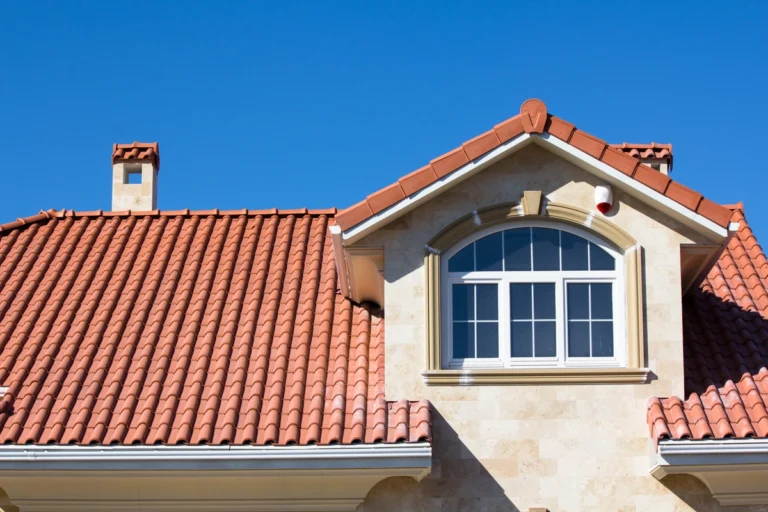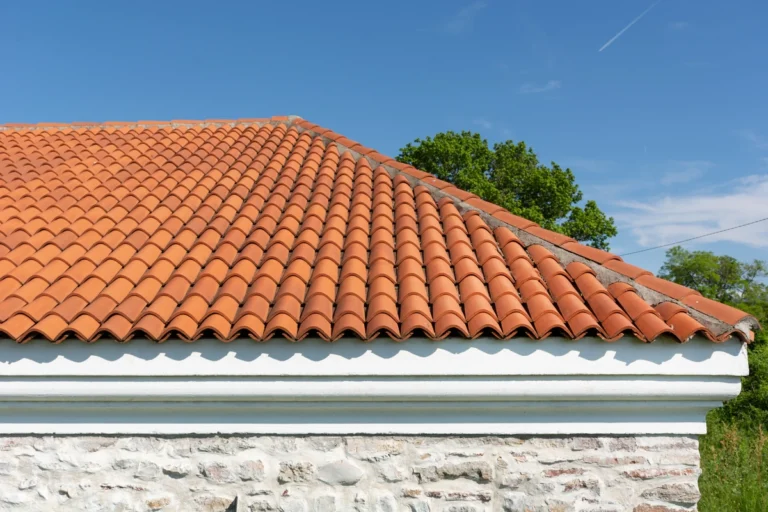In the realm of roofing materials, composite roofing stands as a versatile and popular option, offering a blend of durability, aesthetics, and affordability. As homeowners seek reliable solutions that balance functionality with curb appeal, composite roofing emerges as a frontrunner in the roofing industry.
In today’s guide to composite roofing, we explore:
- The intricacies of composite roofing
- Its composition
- Advantages
- Drawbacks
- Costs
- Longevity
- The considerations when choosing between composite and natural materials
Keep reading to learn more about composite shingles for a roof replacement!
What is Composite Roofing?

Composite roofing, also known as synthetic or asphalt shingle roofing, is crafted from a blend of materials, typically including asphalt, fiberglass, recycled materials, and minerals. This amalgamation results in a durable, weather-resistant, and aesthetically pleasing roofing material. Composite shingles come in various styles, mimicking the appearance of natural materials like wood, slate, or clay tiles, offering homeowners a wide array of design options to complement their architectural preferences.
✅ Pros of Composite Roofing:
- Affordability: One of the primary advantages of composite roofing is its cost-effectiveness compared to natural materials. Composite shingles provide a budget-friendly alternative without compromising on quality or durability, making them accessible to a broader range of homeowners.
- Durability: Composite roofing is engineered to withstand harsh weather conditions, including strong winds, rain, hail, and UV exposure. Its composition of asphalt and fiberglass ensures resilience against elemental wear and tear, prolonging the lifespan of the roof.
- Versatility: With an extensive selection of colors, textures, and styles, composite shingles offer versatility in design, allowing homeowners to achieve their desired aesthetic without sacrificing durability or performance.
- Ease of Installation: Composite roofing is relatively lightweight compared to natural materials, facilitating easier installation and reducing labor costs. Additionally, composite shingles often come in larger sizes, covering more surface area per shingle and expediting the installation process.
- Low Maintenance: Unlike some natural roofing materials that require regular maintenance and upkeep, composite shingles are low maintenance, requiring minimal attention beyond periodic inspections and cleaning.
❌ Cons of Composite Roofing:
- Environmental Impact: While some composite roofing materials incorporate recycled content, the production and disposal of asphalt-based shingles can have a significant environmental impact. However, advancements in recycling programs and the development of eco-friendly alternatives aim to mitigate these concerns.
- Lifespan: While composite roofing offers durability, it typically has a shorter lifespan compared to certain natural materials such as slate or clay tiles. Depending on the quality of the shingles and environmental factors, composite roofs may require replacement within 20 to 30 years.
- Susceptibility to Algae and Moss Growth: Composite shingles are prone to algae and moss growth, particularly in humid climates or shaded areas. While this doesn’t necessarily compromise the integrity of the roof, it can detract from its aesthetic appeal and require periodic cleaning or treatment.
- Vulnerability to Temperature Extremes: Extreme temperature fluctuations can affect the performance of composite roofing, potentially leading to thermal expansion and contraction, which may contribute to premature aging or damage.
Cost of Composite Roofing

The cost of composite roofing varies depending on several factors, including the quality of materials, the complexity of the installation, and regional pricing differences. On average, homeowners can expect to pay between $3 to $5 per square foot for composite shingles, including materials and installation. However, premium composite shingles or specialized designs may command higher prices, while basic installations on standard roof structures may fall on the lower end of the price spectrum.
Longevity of Composite Roofing
Composite roofing typically offers a lifespan of 20 to 30 years, depending on various factors such as climate, maintenance, and the quality of installation. While composite shingles are engineered for durability, their lifespan may be shorter than that of natural materials such as slate or clay tiles, which can last upwards of 50 to 100 years with proper maintenance.
Choosing Between Composite and Natural Materials: 4 Factors
When deciding between composite roofing and natural materials, homeowners should consider several key factors to make an informed choice:
1) Aesthetic Preferences:
Natural materials like slate, wood, or clay tiles offer unique textures and colors that may appeal to homeowners seeking a traditional or upscale aesthetic. Conversely, composite roofing provides a diverse range of styles that mimic the look of natural materials at a fraction of the cost.
2) Budgetary Constraints:
Composite roofing presents a more budget-friendly option compared to natural materials, making it suitable for homeowners looking to achieve a durable and attractive roof without breaking the bank.
3) Climate Considerations:

Climate plays a significant role in the performance of roofing materials. While composite roofing offers resilience against various weather conditions, natural materials like slate excel in extreme climates due to their innate durability and thermal properties.
4) Long-Term Investment:
Homeowners should assess the long-term costs and benefits of each roofing material, considering factors such as lifespan, maintenance requirements, and potential resale value. While composite roofing may offer immediate cost savings, natural materials can provide greater longevity and aesthetic appeal, potentially enhancing the overall value of the property.
Your Composite Shingle Roof Experts
Composite roofing emerges as a compelling choice for homeowners seeking a durable, cost-effective, and aesthetically pleasing roofing solution. With its versatility, affordability, and proven performance, composite shingles continue to dominate the roofing market, offering an attractive alternative to natural materials. By weighing the pros and cons, understanding the costs and longevity, and considering individual preferences and climate factors, homeowners can make an informed decision when selecting the roofing material that best suits their needs and enhances the beauty and functionality of their homes.
Ready to make the switch to a composite roof? Contact Trust Roofing today to learn about the pros and cons of synthetic composite roofing materials and traditional roofing materials.




